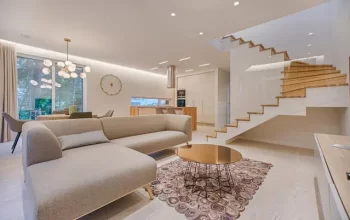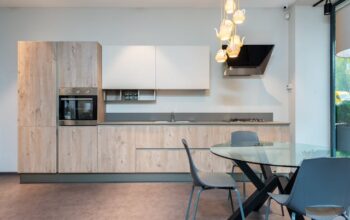When choosing the right windows for your home, several factors come into play. One of the key decisions is whether to go with wood-framed windows or vinyl framed windows. Each option has its own set of pros and cons.
This guide will help you understand the differences and help you make a well-informed choice for your home.
Aesthetic Appeal
Appearance is often the first thing people consider when picking new windows. Wood-framed windows have a timeless, classic look. They can fit various home styles, from traditional to modern.
Wood has a natural beauty that’s not easy to mimic. You can paint or stain wood frames to match your home’s décor. Plus, wood can be carved or shaped to create custom looks, adding to your home’s visual appeal.
Vinyl-framed windows, on the other hand, look more modern. Vinyl comes in many colors, but you can’t paint or stain it like wood. However, it’s designed to keep its color and appearance over time. This makes vinyl a low-maintenance option for those who want a sleek, modern look.
While vinyl windows come in various styles, they don’t offer the same level of customization as wood. If you’re in the area, you can find a few options from a reputable company that does window installation in Simi Valley.
Durability and Maintenance
Wood and vinyl have different advantages when it comes to durability. Wood-framed windows can last for decades if you take good care of them. However, wood can suffer from rot, insect damage, and warping, especially in humid or extreme weather conditions.
To keep wood windows in good shape, you need to paint and seal them regularly. Ignoring this care can lead to costly repairs or replacements.
Vinyl-framed windows are known for being durable and low maintenance. They resist rot and insect damage and don’t warp. Vinyl is less affected by humidity and temperature changes.
Maintenance is minimal. It is usually just cleaning with soap and water. This makes vinyl appealing for homeowners who don’t want to spend time and effort on window upkeep.
Energy Efficiency
Energy efficiency is a crucial factor when choosing windows. Both wood and vinyl windows can provide good insulation, but they perform differently.
Wood naturally insulates well, offering excellent thermal and sound insulation. Wood-framed windows help keep your home warm in winter and cool in summer, which can lower your energy bills. Properly installed and maintained wood windows contribute to your home’s overall energy efficiency.
Vinyl-framed windows also offer good insulation, especially with multi-chambered frames and insulated glass. Many vinyl windows come with energy-efficient features such as low-E (low-emissivity) coatings. These coatings reflect heat away in summer and keep it inside during winter.
While vinyl may not insulate as well as wood, it still performs well in terms of energy savings. Choosing vinyl windows with added energy-efficient features can boost their performance.
Cost Considerations
Cost is another big factor in choosing between wood and vinyl-framed windows. Wood windows usually cost more than vinyl ones due to materials, craftsmanship, and the need for regular maintenance. High-quality custom wood windows can be even pricier.
However, many homeowners feel that the beauty and potential increase in property value justify the cost of wood windows. Vinyl windows are generally more affordable. They offer a budget-friendly solution while still providing quality and durability.
The lower initial cost and minimal maintenance expenses make vinyl windows attractive to many people. Vinyl windows are also easier to install, which can lower labor costs.
Environmental Impact
Wood is a renewable resource and, if sourced responsibly, can be eco-friendly. Many manufacturers offer windows made from sustainably harvested wood.
However, the downsides include deforestation. It also needs chemical treatments to prevent rot and insect damage.
Vinyl is made from polyvinyl chloride (PVC), a type of plastic. Producing PVC uses fossil fuels and releases harmful chemicals. This gives vinyl windows a larger environmental footprint compared to wood.
However, some manufacturers are making efforts to reduce this impact by recycling old vinyl windows. They also use eco-friendly additives in production.
Resale Value
The windows you choose can affect your home’s resale value. Wood-framed windows often add more value due to their classic, high-end appearance. Potential buyers might appreciate the elegance and warmth of wood windows.
This makes your home more attractive on the market. Well-maintained wood windows can be a strong selling point. It contributes to a higher resale price.
Vinyl windows, while not as highly valued as wood, still offer a good return on investment. Their durability and low maintenance appeal to many buyers. This makes them a practical choice.
Installation and Customization
Installation and customization are other essential factors. Wood windows usually need professional installation due to their weight and the precision needed for a proper fit. This can increase the overall cost and time spent on installation. However, wood’s customizability means you can achieve a perfect fit and style tailored to your home.
Vinyl windows are generally easier to install, allowing for quicker, less costly processes. Vinyl frames come in standard sizes and styles, which can make installation easier. However, this also means there are fewer customization options compared to wood. If you have unique window shapes or styles, you might find vinyl limiting.
Noise Reduction
Both wood and vinyl windows can reduce noise, which is vital for homeowners in noisy areas. Wood’s natural insulating properties help to dampen outside noise, creating a quieter indoor environment. The density of wood helps block and absorb sound waves, making it an excellent choice for noise reduction.
Vinyl windows can also reduce noise, especially with double or triple-paned glass. The air pockets and insulation within the vinyl frame help minimize sound transmission.
While vinyl windows provide good noise reduction, they may not perform as well as wood in extremely noisy environments. Still, both types can improve your home’s tranquility.
Choosing Between Wood and Vinyl Framed Windows
Choosing between wood and vinyl framed windows depends on your personal preferences and needs. Both options offer unique benefits and can enhance your home’s beauty and value.
Wood provides a timeless look with customization options. Vinyl offers durability and low maintenance at a more affordable cost. Carefully consider your priorities to determine which option is best for your home.
With proper installation and maintenance, both can provide comfort and aesthetic appeal for years to come. Weigh the pros and cons to make a decision that will suit you in the long run.
For similar topics, visit our blog!



